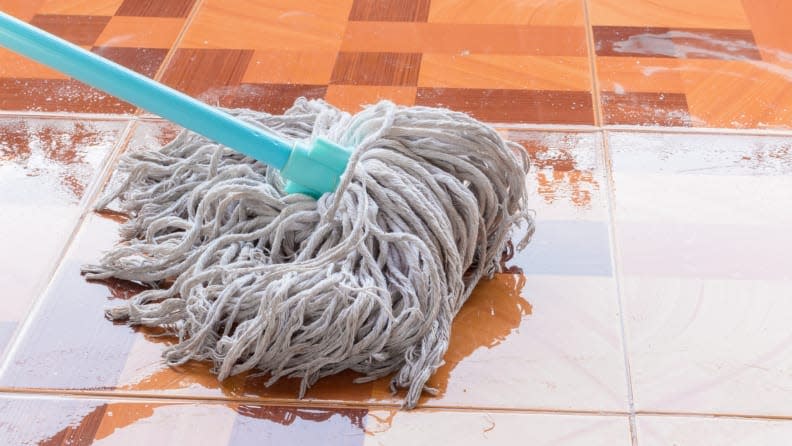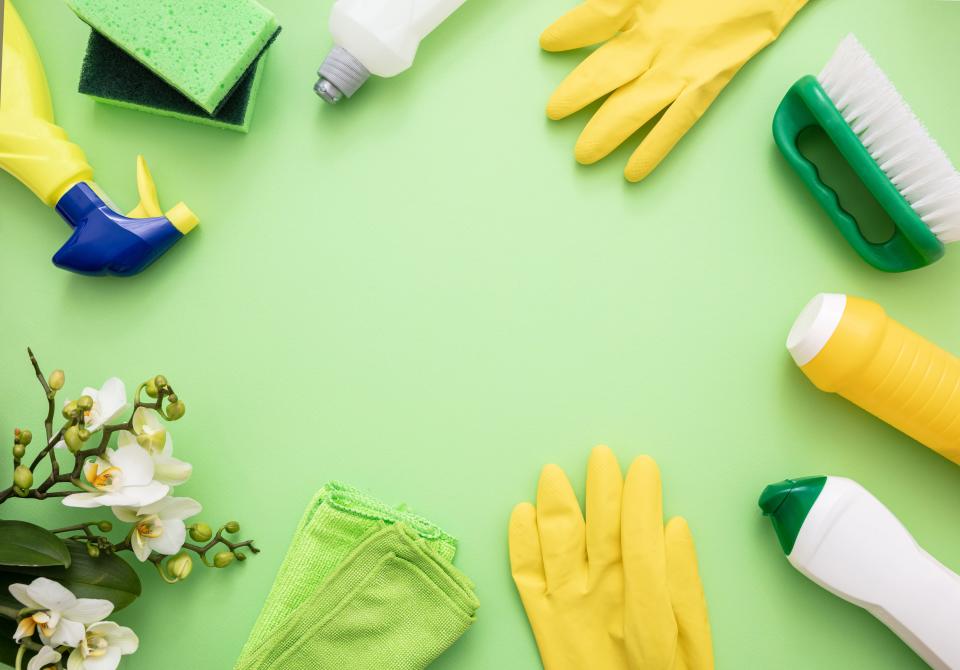I can't fix all the world's problems, but I can scrub my floor. That's something.
When I was laid off in early 2020, shortly before COVID-19 would metastasize into a pandemic, I did what millions of other Americans soon would do: I began job-hunting. I emailed my network of former colleagues and professional contacts. I filtered listings on LinkedIn and other job sites. I updated my resume. Within a few weeks, after landing one-off freelance projects from precisely two clients and then nothing, I knew what else I had to do: I got down on my hands and knees and scoured our bathroom floor.
I mixed up a paste of baking soda and hydrogen peroxide, which I then scrubbed into the grout with an old toothbrush, starting in the farthest corner from the door. After covering a swath the length of my arm, I wiped it clean with a wet sponge, made another batch of paste and moved on to the next section. I didn’t listen to music or a podcast as I worked. I don’t remember thinking about anything in particular. I just kept at it, square by square, for a couple of hours. Then I was done. The lines of grout, which had turned a musky orange over the years, were chalky white once again.
I had had a job to do and I had completed it. I had accomplished something even if no one except my wife and I would ever know it. I felt gratified. I also felt renewed. That internal monolog – that chatterbox alternating between replaying what had happened earlier and rehearsing for what might happen later – had stopped. At least while I scrubbed away, I had put that busy voice in my head on mute.
Rewards in drudgery
Surveys and research show most people hate doing household chores – washing dishes, cleaning the bathroom, ironing, etc. – but sweeping, scrubbing or mopping the floor consistently ranks as one of the worst of all. In one poll, in fact, 33% of women and 22% of men said they’d give up alcohol for a year if they would never have to wipe down another floor again. For that same forever pass, a smaller subset said they’d abstain from sex for a year.

It’s easy to see why people would go to extremes to avoid the mop. Scrubbing the floor defines drudgery and even servitude and penury. Cinderella mopped the floor while her stepsisters skipped off to the ball. Widowed and penniless, Red Skelton’s mother eked out a living scrubbing floors. Sailors swab ship decks. Yesterday’s lowly charwomen mopped floors, as do today’s cleaning ladies, janitors and minimum-wagers at McDonald’s.
USA TODAY's Connie Schultz: My gratitude, stitch by stitch
But mopping, like housekeeping generally, has its rewards. We can’t affect most of the world around us, but we can, however briefly, within our homes. With each bucket of dirty mop water we pour out (or dust-clotted Swiffer we throw away), we can see the difference we’ve just made. These small achievements have become even more meaningful to me since COVID-19 tsumanied over us and showed us just how inconsequential we are.
Why cleaning has meaning
Some ascribe an even higher purpose to cleaning. “Every repetitive action can either become routine, which has a dulling effect, or when done with love and awareness can become a spiritual path,” Linda Thomas, a home-economics proponent who ran her own cleaning company in Switzerland, writes in her book, “Why Cleaning Has Meaning: Bringing Wellbeing Into Your Home.”
Repetitive actions can also be therapeutic. In a series of studies, David Eilam, now a professor emeritus of zoology at Tel Aviv University, has found that repetitive or ritualized behaviors alleviate anxiety by generating a greater sense of control or predictability.
I’ve been doing household chores for a long time, since I was a kid and my mother asked me and my younger sister and brother to choose a task in exchange for our weekly allowance. I vacuumed, mowed the lawn, swept out the garage and, occasionally, did the laundry, depending on which of us got to pick first that week.

Today, decades older, I’m the one who mops, vacuums, dusts, Windexes the windows and mirrors and, yes, sweeps out the garage. I’m also the one who – obsessively, I’ve been told – wipes down the kitchen countertops, cabinet handles, light switches, door knobs, faucets and the keypad on the microwave to get rid of smudges. Setting us apart from most of our friends, my wife and I have never had a cleaning person. It’s not just the money. It’s more, why wouldn’t you do this yourself?
COVID heroes: Custodians deserve our gratitude. I know because my dad worked as a cleaner.
We used to do yoga at our neighborhood YMCA, until it was torn down and replaced by a shopping center. At the end of each class, we would lie on our backs in shavasana, or the corpse pose, and relax our bodies, one part at a time, until we had let go entirely. My breath slowed and my heart rate dropped. My thoughts quieted. The outside world disappeared.

Scrubbing the floor – focusing on a mechanical action that takes concentration but no brainpower – has the same calming effect on me. Instead of fixating on the next problem (or opportunity, to put it positively), I can go on autopilot and let my mind wander or go blank.
The other day, I toted our spin mop up from the basement. I filled the bucket with hot water spiked with Mr. Clean, smooshed the mop in the suds, gave the foot pedal a few pumps to wring out the mop and began cleaning the first floor of our house. Several buckets later, I had finished all 700 square feet. Ahh.
Michael Arndt is a a long-time editor and writer based in Chicago, formerly with Bloomberg Businessweek, Chicago Tribune, Crain's Chicago Business and the Harris Poll.
You can read diverse opinions from our Board of Contributors and other writers on the Opinion front page, on Twitter @usatodayopinion and in our daily Opinion newsletter. To respond to a column, submit a comment to letters@usatoday.com.
This article originally appeared on USA TODAY: Household chores are meditative, calming and help you feel in control

 Yahoo Movies
Yahoo Movies 
